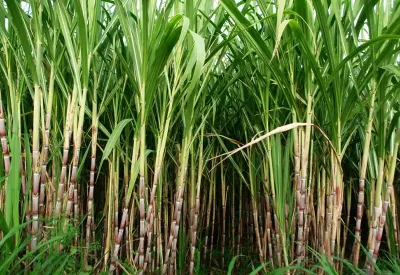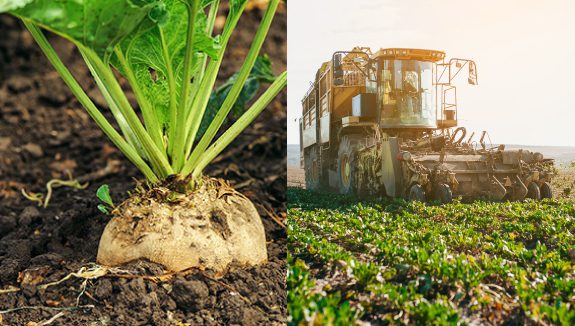How green is Sugar beet vs sugar cane farming?
Wiki Article
The Great Dispute: Sugar Beet Vs Sugar Cane - Which Is the Superior Choice for Sweeteners?
The discussion over sugar beet versus sugar cane as the preferred sugar includes a number of critical aspects. Each deals unique benefits and difficulties relating to production, flavor, and health implications. While sugar beet might interest those prioritizing sustainability, sugar cane has its own social and culinary value. As customers become extra mindful of their options, the inquiry stays: which sugar really attracts attention in today's market?The Origins of Sugar Beet and Sugar Cane
Although sugar cane has actually been grown for thousands of years, mostly in tropical areas, sugar beet became a substantial alternative in cooler climates throughout the 18th century. Sugar cane, belonging to Southeast Asia, was initial tamed around 8000 BCE and spread out worldwide with profession and exploration. Its high sucrose material made it a useful crop, bring about considerable plantations in areas like the Caribbean and Brazil.In contrast, sugar beet was first cultivated in the Mediterranean around the 18th century, specifically getting traction in Europe as a reaction to sugar cane lacks. The plant grows in warm environments, making it suitable for regions with chillier climate. The exploration that sugar might be removed from beet origins revolutionized sugar manufacturing, especially during the Napoleonic Wars when trade restrictions minimal cane sugar accessibility. The increase of sugar beet farming noted a pivotal minute in the history of sugar, giving a local resource for several nations.
Production Procedures: From Area to Sugar
The manufacturing procedures of sugar beet and sugar cane reveal significant distinctions in growing strategies, collecting methods, and refinement phases. Comprehending these nuances is essential for valuing exactly how each crop adds to the overall sugar market. This contrast highlights the distinct features and obstacles associated with both sources of sweetness.
Farming Strategies Contrast
Cultivation methods for sugar beet and sugar cane reveal distinctive techniques that influence their manufacturing processes, from field prep work to final sweetener removal. Sugar beet cultivation commonly involves raking and harrowing to create a great seedbed, followed by seeding in rows to facilitate development. This crop gain from cooler climates and is often planted in springtime. In contrast, sugar cane is typically grown in furrows with pre-sprouted cane pieces, requiring a warm, tropical climate for ideal development. Cane fields are commonly set out to take care of water efficiently, provided its demand for substantial irrigation. Both crops are managed with details fertilization and bug control practices tailored to their growth atmospheres, influencing return quality and performance in sweetener removal.
Collecting Methods Described
Effective harvesting methods for sugar beet and sugar cane play an important function in ensuring maximum yield and top quality of the final product. Sugar beet gathering typically utilizes mechanized root farmers, which successfully root out the beetroots from the dirt and different them from the foliage. This approach decreases damages to the beetroots and minimizes labor expenses. In comparison, sugar cane harvesting might make use of either manual work or machinery, relying on the area and range of manufacturing. Mechanical farmers reduced the cane at the base and typically remove the fallen leaves, enhancing the process for larger fields. Both methods require cautious timing to ensure the crops are harvested at peak sweet taste, influencing the high quality of the last sugar product.Refinement Process Differences
While both sugar beet and sugar cane undergo rigorous improvement procedures to transform their raw forms right into functional sugar, the methods employed vary considerably. Sugar beet refinement starts with washing and slicing the beetroots right into thin cossettes, followed by diffusion, where hot water essences sucrose. The resulting juice is after that purified, concentrated, and taken shape. In contrast, sugar cane processing involves squashing the stalks to extract juice, which is after that made clear using lime and warmth to remove contaminations. The cane juice is vaporized to form syrup before condensation. Eventually, while both processes aim to produce white sugar, the distinctive methods highlight the one-of-a-kind features of each source and their ramifications for taste and purity in the last product.Nutritional Profiles: What's in Your Sugar?
The dietary accounts of sugar beet and sugar cane existing distinct distinctions worth analyzing. This contrast includes aspects such as calorie web content, mineral and vitamin existence, and variations in glycemic index. Understanding these variables can supply understandings into just how each sugar might affect total health.Calorie Content Comparison
Recognizing the caloric material of sugar beet and sugar cane is necessary for those conscious of their dietary selections. Both sweeteners mainly contain sucrose, adding a comparable calorie worth. Generally, sugar beet has approximately 387 calories per 100 grams, while sugar cane has regarding 390 calories per the very same quantity. The slight difference in caloric content may not substantially impact most diet plans; however, it is amazing for those very closely monitoring their caloric intake. In addition, both sugar resources provide power however lack necessary nutrients, making them largely sources of empty calories. Consequently, people looking for healthier alternatives may wish to take into consideration these factors when choosing in between sugar beet and sugar cane as their liked sweetener.
Mineral and Vitamin Web Content
Caloric material gives only a part of the picture when assessing sugar beet and sugar cane. Both resources of sugar vary substantially in their mineral and vitamin profiles. Sugar beetroots are incredibly rich in important nutrients, consisting of potassium, magnesium, and iron. They likewise include percentages of vitamins such as B6 and folate, contributing to their dietary value. In comparison, sugar cane provides a various collection of benefits, including calcium, phosphorus, and traces of B vitamins. While neither choice is a substantial resource of minerals and vitamins compared to whole foods, sugar beetroots may have a small side due to their higher mineral web content. Eventually, customers seeking dietary advantages from sweeteners should take into consideration these differences in profiles.Glycemic Index Distinctions
Glycemic index plays an important duty in evaluating just how different sweeteners impact blood glucose degrees. Sugar beet and sugar cane display noteworthy distinctions in their glycemic actions. Generally, sugar beet has a reduced glycemic index contrasted to sugar cane, causing a slower and steadier increase in blood sugar levels after intake. This quality might make sugar beet a better alternative for people managing diabetic issues or those looking for to maintain secure power degrees. On the other hand, sugar cane tends to cause a more quick spike in blood sugar, which can result in quicker power crashes. Recognizing these differences is significant for consumers aiming to make informed nutritional options concerning sugar and their influence on general wellness.Ecological Influence: Sustainability Factors To Consider
While both sugar beet and sugar cane are crucial resources of sugar, their environmental influences and sustainability considerations differ substantially. Sugar beetroots, primarily grown in temperate regions, generally call for much less water and can be grown in diverse environments. They also benefit from crop rotation techniques, which enhance soil health and wellness and decrease the need for synthetic plant foods. Intensive farming of sugar beetroots can lead to soil exhaustion and chemical usage.On the other hand, sugar cane prospers in tropical climates and commonly demands considerable water resources for irrigation (Sugar beet vs sugar cane). The monoculture nature of sugar cane farming can exacerbate soil disintegration and biodiversity loss. In addition, the burning of cane areas before look at more info harvest releases carbon emissions and adds to air pollution. Both crops face challenges relevant to environment change, yet their differing cultivation techniques greatly affect their general sustainability profiles. Therefore, the selection between sugar beet and sugar cane entails considering these ecological effects thoroughly
Taste and Culinary Utilizes: Which Sweetener Reigns Supreme?
The option between sugar beet and sugar cane prolongs beyond environmental factors to consider to encompass taste and culinary applications. Sugar beet, usually regarded as having a slightly different flavor account, has a tendency to be much less pleasant than sugar cane. This refined distinction can affect its usage in dishes, specifically in baked items where a neutral sweet taste is wanted.Conversely, sugar cane is celebrated for its distinct, abundant, and extra complex taste, making it a recommended selection for beverages and treats - Sugar beet vs sugar cane. Its all-natural molasses content can improve the deepness of flavors in different meals
In cooking, sugar cane's adaptability radiates with in marinates, lusters, and confections, while sugar beet is typically found in processed foods and sugar like granulated sugar. Inevitably, the choice between the 2 sugar commonly rests on individual taste preferences and specific culinary applications, with each offering one-of-a-kind advantages in sites the cooking area.
Health Ramifications: Sugar Beet Vs Sugar Cane
Both sugar beet and sugar cane have unique health and wellness ramifications that can affect consumer options. Sugar beet vs sugar cane. Sugar beet is usually pertained to for its higher fiber content, which can assist digestive health. Additionally, it includes certain anti-oxidants that might add to total health. On the various other hand, sugar cane is rich in nutrients such as calcium, potassium, and magnesium, offering some mineral benefitsBoth sources mostly consist of sucrose, which can lead to similar health issues when consumed exceedingly, such as obesity, diabetes, and heart condition. The processing techniques also differ; sugar beet is generally fine-tuned much more intensively, potentially causing a loss of particular nutrients. Consumers concerned about ingredients may prefer sugar cane, as it often undertakes much less processing. Eventually, understanding these health effects can assist people toward making informed choices regarding their sugar choices.
Customer Preferences: Trends and Insights
Consumer choices for sweeteners have actually developed considerably over the last few years, influenced by health and wellness trends, ecological concerns, and dietary selections. Increased understanding of the negative wellness results linked with extreme sugar intake has led many consumers to look for choices. This shift has triggered an expanding interest in all-natural sweeteners, with sugar beet and sugar cane going to the center of discussions.Study indicates that consumers are significantly preferring sugar beet due to its regarded environmental benefits, as it is frequently expanded closer to refining plants, reducing transportation exhausts. Conversely, sugar cane is commonly related to tropical regions and may lug understandings of sustainability challenges.

Regularly Asked Inquiries
How Do Sugar Beet and Sugar Cane Affect Blood Sugar Level Degrees?
Sugar beet and sugar cane both contain sucrose, which can elevate blood sugar levels. The impact greatly depends on specific metabolic process and intake amounts, but both resources add in a similar way to blood sugar reactions most of the times.Which Sugar Is Much Better for Baking and Food preparation?
When examining sweeteners for cooking and cooking, one have to consider texture, taste, and moisture retention. Sugar beet and sugar cane both supply one-of-a-kind qualities, with sugar cane commonly liked for its richer flavor account in culinary applications.Can Sugar Beet or Cane Be Made Use Of in Vegan Diets?
Both sugar beet and sugar cane can be utilized in vegan diet plans. They are plant-derived sugar, making them ideal for people seeking vegan-friendly alternatives without pet items, guaranteeing honest options in their culinary methods.What Are the Historic Uses of Sugar Beet and Cane?
Historically, sugar beet and cane offered as necessary resources of sweetness, with cane grown in exotic regions and beet in warm zones. Both have been essential to numerous cultures, economies, and cooking customs throughout background.Are There Any Alternatives to Sugar Beet and Cane?
Alternatives to sugar find more beet and cane include agave nectar, honey, syrup, and sweetening agents like aspartame and sucralose. These substitutes use varying tastes and health advantages, attracting diverse nutritional preferences and constraints.Report this wiki page